- Home
- Sandra Cisneros
A House of My Own Page 3
A House of My Own Read online
Page 3
Liesel’s job in her filmmaker days had to do with scouting locations, finding permission to shoot there, assisting in arranging the set, drumming up extras, making sure of continuity, and many other details that sounded glamorous to a non-filmmaker. While working in South America on Werner Herzog’s Aguirre, the Wrath of God, she contracted a mysterious disease that came and went and left her doubled over in pain. As a result several filmmakers had pooled resources and bought the Hydra house Liesel occupied but did not own. I was not told the reason for their generosity. I was told it was because she was dying. Liesel was quite convinced of this and was often sick enough to convince others too. Perhaps she was dying now and then. Who knows? I only know it spooked the local Greeks to have such a pale woman with hair and skin the color of a ghost meandering in the cemetery at night and cursing at them during the day because their garbage blew into her garden.
I accompanied Liesel on one of her cemetery excursions. I was fascinated by the Greek graves with their lit oil lamps and unsmiling portraits of the dead imprinted on the headstones just like the Mexican cemeteries, and so long as I wasn’t there alone, I didn’t feel afraid. I was fond of Liesel. She told marvelous stories of a life lived with her foot on the accelerator. At the time she seemed old to me, though now I realize she was younger than I am as I write this.
When I was introduced to islanders, the big question on my mind was “Where did Leonard Cohen live?” I asked and asked, but no one knew or would tell me. I needn’t have looked far. There were enough creative geniuses all about. I have in my journal from that time a postcard by the Juilliard-trained performance artist Charlotte Moorman, the cellist who played nude with a cello made of video screens in 1967 and was the muse of Nam June Paik, the founder of video art. I met her at one of the cafés, where she generously gave me her address and invited me to look her up when I went to New York, but I was too shy and never did.
I had a friendship during this time with a woman almost a decade younger than me. Her name was Willhemina. She was a southern belle who had been sent to live with an aunt in Paris. (In my imagination this aunt looked like the old lady who befriended Babar the elephant.) Somehow Will had managed to wash ashore alone on Hydra. Men ancient and nubile were gaga over Will. She had the wide square face of a farmer’s daughter; pale, freckled skin; strawberry-blond hair; and eyes as sparkling as the Aegean. She was pretty, not beautiful, and there was a disproportion to her body that made me wonder what all the fuss was about. But she was young and had once been a cheerleader, and men like that, I guess.
Will told me about the mandatory diet pills dispensed to all the cheerleaders at the southern university she attended, and it made me want to cry out, “Aw, honey!” And one night when we shared Vasilis’s apartment, she told the story about her abortion. She was an island Holly Golightly, surviving episodes that made me shiver. Where, I wondered, were her goofy parents?
Will said the only thing she missed about the United States was marshmallows. I sent six bags to her when I got home, but they went halfway around the world and boomeranged back to Texas with several postmarks on them stating “Return to sender.” Whatever happened to Will, I’ll never know. It wouldn’t surprise me if she was married to a Greek tycoon.
My own personal life was a mess. I had multiple love affairs because I wanted to protect my heart from the Chicago nemesis. We were in an open relationship, he told me, which meant it suited his wishes, not mine. But it was useless. The less he needed me, the more I wanted him. Independence inspires admiration, and admiration is an aphrodisiac.
Will and me at the Hydra Port
I would try to win his admiration for decades without being aware he was mixed up in my head/heart as the father archetype, till finally one day I realized I would never gain his approval. But then I didn’t need his approval anymore. He was a figment of my imagination.
Meanwhile, back on the island, Konstantinos and I shared a brief romance, but it sputtered out after a few days, leaving only a wisp of smoke.
Konstantinos at forty seemed old to me at twenty-eight. Sometimes when we were intimate, his face transformed into a skull, and I felt as if I were sleeping with Death, though I never told him this. He had large feline eyes, a thin face with extraordinary cheekbones, tousled gladiator hair, and a chin covered with a trim Odysseus beard. He looked precisely like those handsome Egyptian portraits found on the mummies of Fayum, with their eyes as dark and moist as Greek olives. I can see Konstantinos’s charms clearly now, but at the time I knew him I was distracted by the novelty of the boys who hovered about, having dated an older man when I was their age.
When I moved out of Konstantinos’s house, I went on my way with my life without giving him a second thought. He may have admired my independence, and this may have bound him tighter to me. As I write this I apologize for any pain I might have caused Konstantinos by my carelessness, and I forgive the nemesis who similarly caused me the same.
During my season on Hydra my skin was copper from having lived two seasons on two coasts—the Atlantic and the Aegean. I wore my hair long and curly like the Cretan priestesses who leapt over the backs of bulls and held snakes in their hands. I was creating. I had my own money. And, I had a house of my own. This to me was power.
Men came into my life often, and often I found them charming. It was easy to reason, “Why not?” But there was only one I held in my heart: Dimitri, a Greek sailor, who helped distract me from the Chicago nemesis. The others were simply pasatiempos.
My Greek sailor sailed away after a short, intense passion. When I first met him at the port, he told me his name in a gentle and sleepy voice. I liked him immediately. His eyes of The Thousand and One Nights. His prizefighter’s body with a chest like the shield of Achilles. Come to think of it, he looked like a young Javier Bardem. No wonder I’ve been wild about Bardem all these years.
—
The Hydra house and The House on Mango Street are united together in that voyage. An eternal moment, like being in love. I try from this distance to remember where I wrote each of the vignettes from House, but I can only place a few, and as I had no computer then and no place to store my drafts as a voyager, must rely on memory.
The night I began the book in Iowa, I wrote the first chapter, “The House on Mango Street,” “Meme Ortiz,” and a vignette that fell by the wayside.
When I was working as a high school teacher in Chicago, I wrote “Darius & the Clouds,” “Chanclas,” “Minerva Writes Poems,” “Geraldo No Last Name,” and “The Monkey Garden.”
“The Family of Little Feet” was born during the year I was a counselor at Loyola University, my alma mater, after a comment a student made about my own small feet. “Alicia Who Sees Mice” and “What Sally Said” were also based on something spoken by one of my counselees. During this same time in my life I shared “The First Job” with the Chicago writer James McManus. Jim took my work seriously and reminded me to do the same, and this was just what I needed to hear at that time of wobbling faith in my own creative powers.
I finished several vignettes while in Provincetown. Which ones, I can’t be sure. But I remember starting and finishing “Elenita, Cards, Palm, Water” on that round oak library table next to the window that caught the feet of the upstairs tenants stomping up and down the stairs.
One morning, in Athens just before waking, I dreamt the first line of “The Three Sisters.” “They came with the wind that blows in August, thin as a spider web and barely noticed.” Maybe being in Greece made me think in threes; I was a big fan of Robert Graves’s The White Goddess. I tucked that sentence in my journal and ferried it to Hydra, where I wrote the vignette.
One night, with only my flashlight and the moon illuminating the way, I climbed the steps to my Hydra house. I was wrestling with whether to write a story of a violation. I felt protective of my protagonist. I didn’t want any harm to come to her. There was also the difficulty of how to write a story the character didn’t want to tell. And how would I write
it if I had no firsthand experience either as victim or witness?
But then I remembered something that had happened to me in the eighth grade. How a wild boy had grabbed my face against my will and kissed me one night when I was walking home on North Avenue with a girlfriend. How my friend, wiser to the world, had walked off the curb to the street and left me behind alone when this boy and his buddy approached.
The two were possibly no older than we were, but there was something about their swagger that warned her, “Uh-oh, trouble.” I was the one there for the taking. He lunged. I moved my face, but not fast enough, and his mouth landed awkwardly on one eye. It was my first kiss.
He said, “I love you, Spanish girl.” Then they galumphed off roaring, mightily pleased with themselves.
“Did he hurt you?”
“I’m okay I’m okay I’m okay,” pretending it was nothing. But I wasn’t okay. I couldn’t talk about it in words, not even to myself. How my body spoke about it for years. How I told no one and tried to forget it, but trying to forget only made it bob up to the surface like a drowned lady in that swampland called dreams.
—
On the island I was on the same writing schedule as I am today. Midday till sunset. Then I would slip on my leather sandals and fly with the winged feet of Hermes down the three hundred and fifty stone steps to civilization. It was in a way an ideal life. A cloistered convent in the day and The Pirate Bar at night. The eccentric population of the island within reach when I needed their company.
Was I sharing what I was writing with anyone during those two months? Did I show anything to Ifigenia, who was also a writer? I don’t remember any feedback. I typed in the afternoon and sometimes typed through the night. Although I didn’t write the vignettes in linear order or arrange them in a fixed order as I wrote them, and though I told my publisher to suggest an arrangement, I knew intuitively how they were supposed to line up. Two months later when I was lodged in the South of France, I would send instructions to my publisher and make that specific sequence clear.
Toward the end of November, terrible storms with their wild Medusa hair of lightning arrived, sometimes canceling the boats that came and went. I moved my office indoors, but eventually was forced to finish my last week on Hydra down at the port at Vasilis’s house because my house had no heat and, as it was made entirely of stone, was as damp and cold as a mausoleum.
Vasilis liked for me and Will to stay at his place when he was away. I think he thought it enhanced his reputation to have two young girls, one dark, one fair, coming in and out. I’m reminded here of something Carlos Fuentes said, how Don Juan doesn’t realize when he’s turned into Don Quixote.
As I write this, a memory I’d forgotten bubbles to the surface. Vasilis and I are seated on his couch one evening. He lunges forward, his face of a sad prisoner hovering toward me; he’s pushing me on my back, trying to kiss me. But I spring up like a punching clown and laugh so hard, he never tries it again.
The night I finished House, I was staying at Vasilis’s second-floor apartment. It was on a narrow alley beyond the bakery, with no view of the sea but a lovely view of the town and the night sky. I seem to remember the apartment was heated with steam, but this might just be my memory. It was snug and cozy, decorated in the Eastern way with carpets everywhere. Vasilis had gone to Athens, and I had with me that night a tall Greek boy, whom I did not love, with dark raccoon rings under his eyes. I spent my last days on the island with him; I can’t remember why. Men were nuisances when I was writing. They demanded you come to bed at once. They had urgent hungers. But once you fed them, like children they fell asleep. Then I’d get back to my writing.
I was saving a record from Vasilis’s collection for the moment when I finished the book. Strauss’s “Blue Danube.” How quiet the world was that night. There was just the circle of light above my page. It was near four in the morning when I came to the end. I was relieved that the boy in the next room was snoring. This joy was mine, and I wanted to savor it alone.
I opened the windows and pushed the heavy wooden shutters apart even though it was crisp outdoors. They parted with a creak, and the moon stepped in. It was a clear evening filled with stars. The full moon wasn’t expected until the next night, but that evening the night was ablaze, the moonlight washing the white town blue.
The first notes of “The Blue Danube” began, gently, timidly at first. The sky was overwhelmed with strange clouds that night, I remember. I watched them stretch and yawn with the opening notes, and as the music gradually gained momentum, they grew more animated. In the end, they finished hurtling past as swift as a school of fish darting through that sea called the sky.
When the waltz ended I got my Walkman and ran through the blue town to the sea, with Astor Piazzolla and Gerry Mulligan in my ears. When I got to the walkway between Hydra and Kaminia, I climbed up on the wall and began to dance, feeling every bit the sorceress. “I finished!” I shouted, and could see the fishing boats going out for calamari, because calamari is fished only at night. “It’s bad luck to see a woman when one is fishing,” Konstantinos told me. And I wondered if the sailors could see me dancing on the wall like a witch, cursing because they wouldn’t catch any calamari that night.
Then I remembered Liesel, and I went to say goodbye. Liesel was always awake at night, so I wasn’t afraid to call on her at that hour. Years later Liesel would tell me we danced under the moon that night, though I don’t remember. It was all brief and hurried. I had to pack and catch the first morning hydrofoil, and it was almost dawn when I knocked on Liesel’s door.
At daybreak I kissed the raccoon boy goodbye, deposited the house keys, and got on the hydrofoil to Athens, where I mailed the manuscript off from the Syntagma Square post office without making a copy. This seems incredibly reckless to me now in this age of computers, but that’s what my life was like BC.
A decade later when I returned to Hydra, I thought I’d remembered the island perfectly, but when I stepped off the boat, I was aware there was one thing I’d forgotten. The cool breath that rises from the damp stone even in the summer.
Every now and then the sound of a rooster crowing or the mournful cry of a donkey takes me back to my island. Why do I call it “my”? I wonder. Some part of it was given to me for keeps, I believe. Writing today from this distance, it’s as if I’d always lived in that house with windows looking out to the garden and sea.
On the rooftops, Hydra
I thought I was Penelope during my Greek days, but now I realize I was Odysseus. “As you set out for Ithaka / hope your road is a long one, / full of adventure, full of discovery.” As in Cavafy’s poem, I am grateful for the marvelous journey.
No Place Like Home
This was one of two pieces written for the Thomas Wolfe Lecture, the University of North Carolina, Chapel Hill, October 21, 2014. The second, “A Borrowed House,” is included near the end of this collection.
When Thomas Wolfe was already a successful author someone asked him if he would consider moving back to North Carolina. He said, “My writing is my home, now.”
So it was in the 1930s—when the writer Betty Smith moved to Chapel Hill she found herself at home here in more ways than one. First, she found a place that was calm and safe and affordable for a single mom raising two kids, and calm and safe and affordable are essentials for a writer. While living in Chapel Hill, Smith found another home. She came home to a book that would give her permission to write her own best seller, A Tree Grows in Brooklyn. Wolfe’s Of Time and the River guided her back home. It was while living in Chapel Hill that Smith was able to see her childhood more clearly, see her Brooklyn, admit what set her memories apart from others in Chapel Hill, from her own Brooklyn family. So often you have to run away from home and visit other homes first before you can clearly see your own.
The same thing happened to me when I went off to live in the foreign terrain of Iowa for graduate school. It held up a mirror to myself and allowed me to see what made me different
from my workshop classmates, to go home to my Chicago childhood, to the neighborhood and people only I knew, the stories that were mine alone and not those of my brothers or cousins or friends. While at Iowa I began a book that wasn’t part of my thesis, but which served to shelter me during my time there. I needed shelter. Maybe I was never more homeless than during those two years in graduate school. I found my home in the country-folk monologues of Mexican writer Juan Rulfo, the anti-poetics of Chilean poet Nicanor Parra, the rage of Malcolm X.
We find ourselves at home, or homing, in books that allow us to become more ourselves. Home “is not just the place where you were born,” as the travel writer Pico Iyer once noted. “It’s the place where you become yourself.”
When I was a young student in Chicago, big-shouldered Carl Sandburg’s lyrics showed me the way to sing with syllables. I was directed to Mango Street by way of Gwendolyn Brooks, who wrote about the bean eaters in the Bronzeville kitchenettes of South Chicago, of folks who live in cramped apartments with shared bathrooms and not enough hot water. I knew plenty of bean eaters too, but they lived in the Mexican communities of Pilsen, Humboldt Park, Little Village, or Logan Square. Hot water was also a commodity in my home even though we didn’t have to share it with neighbors; we were neighborhood enough in a family of nine. Sandburg and Brooks—their books said, “Come on in!”
The golden pen of Nelson Algren gave Studs Terkel a lift home for keeps and a day, and Studs in turn revolutionized radio by recording the oral histories of the little guy, the never heard, the brave and exhausted from Kentucky to Guanajuato working in factories and steel mills, too busy to get downtown for a little culture. It was Studs who introduced Pablo Neruda’s poetry to my mother from the radio on top of the refrigerator next to the slouched loaf of Wonder Bread. The kitchen was my mother’s classroom, and she was promoted from the ninth grade to the University of Life with a PhD. Studs schooled her. Studs showed her the way home.

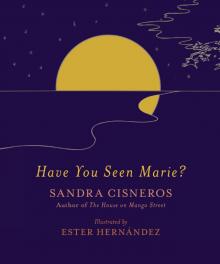 Have You Seen Marie?
Have You Seen Marie?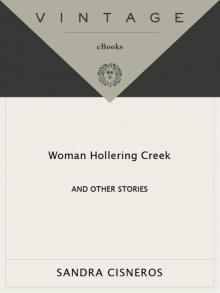 Woman Hollering Creek: And Other Stories
Woman Hollering Creek: And Other Stories The House on Mango Street
The House on Mango Street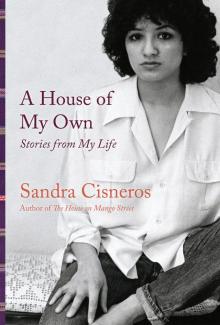 A House of My Own: Stories From My Life
A House of My Own: Stories From My Life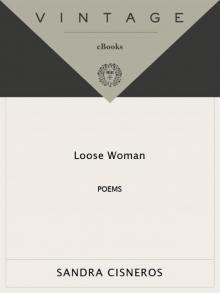 Loose Woman
Loose Woman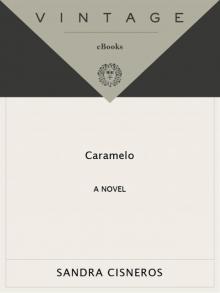 Caramelo
Caramelo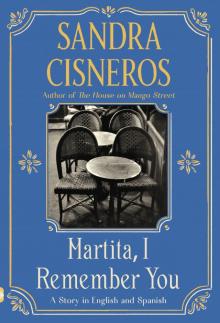 Martita, I Remember You/Martita, te recuerdo
Martita, I Remember You/Martita, te recuerdo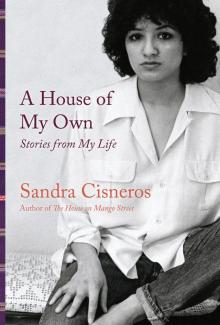 A House of My Own
A House of My Own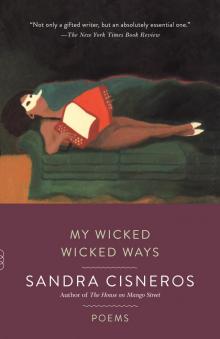 My Wicked Wicked Ways
My Wicked Wicked Ways